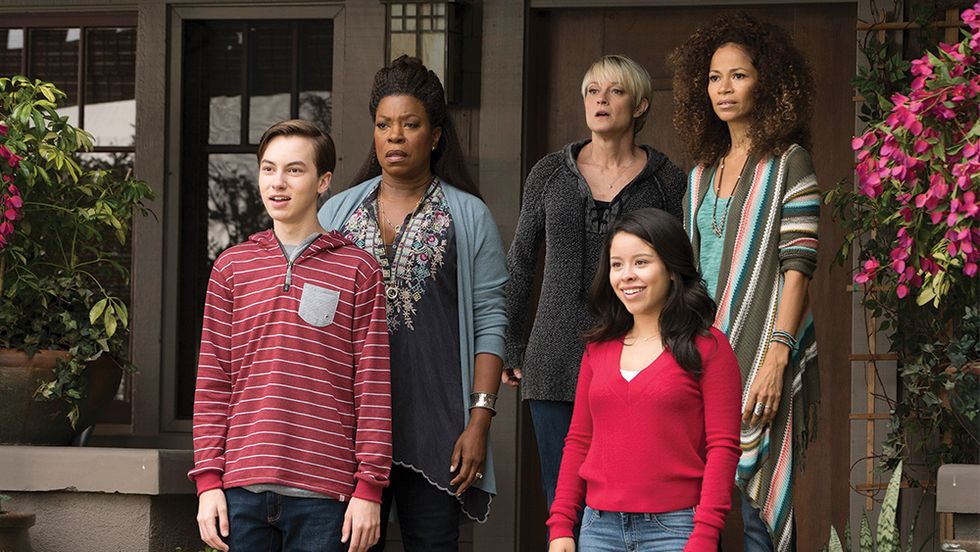Freeform's hit show "The Fosters" ended in June but as someone who doesn't watch cable television anymore, it's just starting for me. Thanks to Netflix, I've made it into the end of season three with two more to go. As I've been watching, the five-year-old show has impressed me and shocked me in many ways in terms of both the writing and the acting. I found myself being pleasantly surprised by the authenticity of the storytelling in this show; while the series is, of course, dramatized a tad, it builds on the realities of relationships, family, and the foster care system in a way that is more meaningful than just a television show.
One of my favorite aspects of "The Fosters" is the fact that it shows the realities of a blended family. Not coming from one myself, I have little to no knowledge of what living in a blended family is like but the series does an amazing job of staying true to the realities of an extraordinary situation. With four adopted children and a child from a previous marriage, the way parents Stef and Lena deal with and communicate with the birth parents and any other parental figures in their kids' lives is impressive. The show, however, does not depict these relationships between the parents, birth parents, children, and siblings as smooth sailing. Not to mention, since the family includes a black woman and two Latinx children, the show explores their identities and experiences in a more representative, personal way and how these storylines play out in their family dynamic. Complications arise and they deal with them openly as a family.
Coupled with the familial aspect, "The Fosters" pursues accurate and realistic storytelling of relationships, especially LGBTQ+ ones. The representation of Stef and Lena's relationship is something that I appreciate greatly. Lesbian couples on television are often stereotyped or dramatized in an extreme way. However, this series does an amazing job of exploring their relationship without tokenizing them or their queerness. Additionally, the actors behind Stef and Lena do their job so well that the love between the on-screen couple almost feels palpable. At times, it doesn't feel like watching a show, it feels as if you are merely a stranger looking in on their lives; that's how real it appears. Stef and Lena's storyline explores marital rough patches complete with communication issues and hints of infidelity, navigating parenting, and health issues, to name a few. The nature of their relationship is honest, even when it's not necessarily convenient, but that's real life. It feels like the norm but in terms of modern television, the relationship between the wives has been something refreshing to see.
In the same fashion, the series offers a fresh perspective of teenage life that has also been missing from media. With all five of the Adams-Foster kids being teenagers, it can be easy to just stick to the usual tropes that dominate youth-centered television. But "The Fosters" doesn't trivialize or attempt to minimize the experiences of teens, it portrays their lives in a way that is almost scarily familiar to teen viewers. It goes beyond just being relatable, the cast and crew of the show clearly make an attempt to delicately handle teenagers' stories with care, articulating the significant and even seemingly insignificant moments in a way that gives other teens the idea that their emotions and experiences are as important as anyone else's.
The series moves through topics such as sexuality, rape, friendship, abuse, addiction, race (half the cast are people of color, which is considered progressive since most representation of other backgrounds were slim especially in 2013 when the show aired) love, religion, and trauma. with a sensitivity missing in teen-oriented shows. With a focus on genuine reactions and expressions of these topics, "The Fosters" serves as a safe space that doesn't exploit these situations. The overarching dedication to bringing attention to the foster care system for the good and the bad. It obviously cannot speak to every foster kid's experience but many feel that the show is doing right by bringing foster care and adoption to a national primetime platform.
Christ Chmielewski, the editor of Foster Focus magazine, said of the show in its beginning stages that it, "speaks to the issues of foster care in a way that is real, yet not preachy." No doubt that there are always problematic aspects being that it is prime time television but "The Fosters" offered me a newfound appreciation for television and renewed my hope for authentic and inclusive storytelling.

















